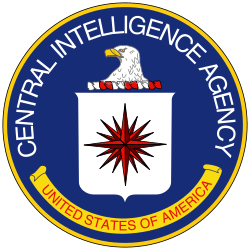Edwin Kennedy Wright
Edwin Kennedy Wright (December 28, 1898 – September 3, 1983) was a career US Army officer and Deputy Director of the US Central Intelligence Agency.
Biography
He was born on December 28, 1898 in Portland, Oregon.
Wright (nicknamed 'Pinky' by his friends) attended Oregon State College and enlisted in military service in 1920 with the Oregon National Guard. He was commissioned as a 2nd Lieutenant in the regular Army on July 3, 1923. He achieved distinction as an Armored Force (tank corps) Instructor and G-3 operations officer before becoming an intelligence briefing officer during WW-II on the staff of Gen. Omar N. Bradley at 12th US Army Group in Europe. After the war Colonel Wright became Executive Director of the Intelligence Division, US Army general staff in the War Department (Feb-Jun 1946) under Gen. George C. Marshall. On Bradley's recommendation, Wright became Deputy G-2 under then Army-Air Forces Maj. Gen. Hoyt S. Vandenberg (G-2).[1]
President Truman appointed Vandenberg to replace Adm. Sidney Souers as the second Director of Central Intelligence (CIG-CIA) on January 20, 1946. Wright became Vandenberg's Executive to the Director of CIG the same date. The National Security Act of 1947, signed into law by Truman, gave legislative authority to the new Central Intelligence Agency (CIA). Wright was promoted to Brigadier General on February 3, 1947, becoming the first Deputy Director of Central Intelligence (DDCI) (1947-1949), serving under both Vandenberg and his successor (the third DCI) Adm. Roscoe Hillenkoetter. Hillenkoetter and the new Defense Secretary, James Forrestal, injected DDCI Wright into interagency disputes over which department was to direct 'black activities' under clandestine operations. General Wright insisted that the CIA "was and had to be the sole agency to conduct organized foreign clandestine operations." [2][3]
In 1949, Wright was assigned to General MacArthur's G-3 operations staff at headquarters Far East Command (Tokyo). He was promoted to Major General on March 8, 1952, becoming Commander of the US Military District of Washington (1952-1954), then took over as commanding general of the 6th US Army Infantry Division at Fort Ord, California. Major General Wright retired on September 30, 1955. He was awarded the Silver Star Medal (1950 - for "conspicuous gallantry and intrepidity in action against the enemy in Korea") followed by the Army Distinguished Service Medal (1952).
He died on September 3, 1983 at age 85 after a 35-year distinguished military career and service on the front lines in two major wars.[4][5]
References
- ↑ Montague, Dr. Ludwell Lee (1992). General Walter Bedell Smith as Director of Central Intelligence - October 1950-February 1953. USA: The Pennsylvania State University Press. pp. 27–30. ISBN 0-271-00751-6.
- ↑ Darling, Dr. Arthur B. (1990) The Central Intelligence Agency: An Instrument of Government to 1950; The Pennsylvania State University Press; USA; pp. 116, 259-260, 316; ISBN 0-271-00717-6;
- ↑ CIA website: https://www.cia.gov/library/center-for-the-study-of-intelligence/csi-publications/books-and-monographs/directors-and-deputy-directors-of-central-intelligence/wright.html
- ↑ Edwin K Wright: http://yellowlegs-and-others.com/Biography/biography-detail/W/Wright,_Edwin_Kennedy_(Pinky)_[BGen_G-3_FEC].htm
- ↑ Gen Edwin Kennedy Wright at Find a Grave
